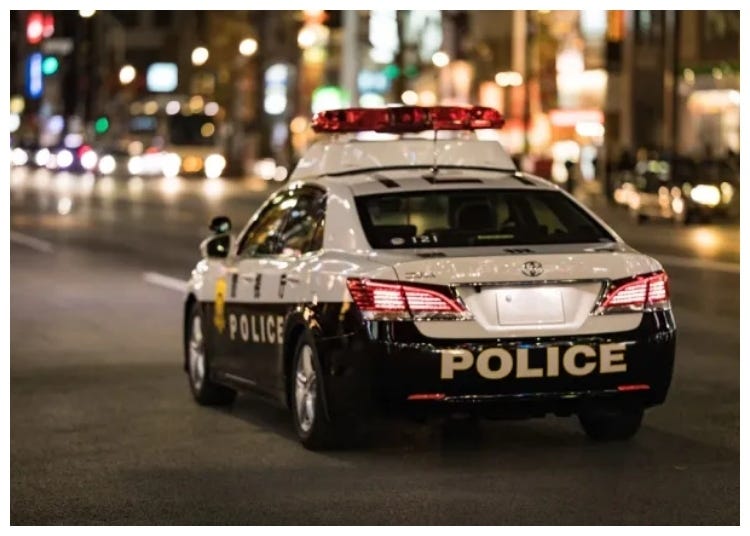
Getting arrested in Japan is never a good idea, but it’s about to become even more inadvisable for foreigners.
Right now, if the Japanese police are formally questioning a person who doesn’t speak Japanese, they’re required to provide an interpreter, who will provide in-person translations at the police station where the suspect is being questioned. That’s going to change, though, and it’s going to change very soon, due to a revision of the National Police Agency’s Criminal Investigation Protocols.
According to the agency’s statistics, 12,170 foreigners were arrested in Japan in 2024, the second consecutive annual increase and the largest amount in 15 years. In addition, there were over 9,500 other crimes determined to have been committed by foreigners with non-arrest outcomes, the agency says. With the need for interpreters increasing, an in-person interpreter will no longer be guaranteed, and instead foreigners who are being questioned may be assigned an off-site interpreter who interprets over the phone or via a voice chat device.
Japan currently has around 4,200 police officers and personnel who are proficient in a foreign (i.e. non-Japanese) language, supported by a network of roughly 9,600 civilian interpreters who can be called in if their services are needed. That might seem like a sufficiently large talent pool, but those are the numbers of potential interpreters nationwide, and for all languages. As Japan’s resident foreign national and inbound international traveler demographics diversify, both in country of origin and where they’re living/traveling in Japan, the National Police Agency says investigators aren’t always able to locate a nearby translator who not only speaks the specific native language of the suspect, but who’s also available to come to the station on short notice. Under the new system, when an interpreter is not available, the suspect will be brought to the nearest police station for questioning, with an interpreter working remotely.
For the police, the new system will allow for quicker questionings, which in turn could help in investigations of ongoing crimes or searches for at-large accomplices. From the perspective of the foreigner being questioned, though, this is a disadvantageous policy shift. Speaking over the phone adds an extra degree of difficulty to communication, increasing the possibility of linguistic mistranslation or psychological misinterpretation. It also makes it more difficult for interpreters to reference documents, photos, or other physical items that the police might be presenting to the foreign suspect as part of the questioning, which could be especially dangerous if the suspect is being asked to sign forms that they’re unable to read by the officers in the room.
It’s worth noting that even under the new rules, the proscribed preferred option is for investigators to search for an interpreter who’s available to work in-person. However, it appears the decision of when to call it quits and switch to a remote interpreter will be a judgement call to be made by local authorities.
The new questioning protocols go into effect July 1.
Source: NHK News Web, FNN Prime Online
Top image: Pakutaso
*Prices and options mentioned are subject to change.
*Unless stated otherwise, all prices include tax.
Recommended places for you
-

Jukuseiniku-to Namamottsuarera Nikubaru Italian Nikutaria Sannomiya
Izakaya
Kobe, Sannomiya, Kitano
-
Goods

Yoshida Gennojo-Roho Kyoto Buddhist Altars
Gift Shops
Nijo Castle, Kyoto Imperial Palace
-

ISHIDAYA Hanare
Yakiniku
Kobe, Sannomiya, Kitano
-
Appealing

Rukku and Uohei
Izakaya
Sapporo / Chitose
-

Kanzenkoshitsuyakinikutabehodai Gyugyu Paradise Sannomiya
Yakiniku
Kobe, Sannomiya, Kitano
-

Kambei Sannomiyahonten
Yakiniku
Kobe, Sannomiya, Kitano
-

Super long ebi fry proves Japanese portion sizes aren’t always small
-

Fewer Japanese people traveling domestically, government blames birth rate, others blame foreign crowds, costs
-

A Don Quijote Like No Other: Step Inside the All-New Tourist-Friendly Store at Shinjuku Tonanguchi Bekkan (Open June 13)
by: Chehui Peh
-

New retro museum in Tokyo is like a time portal back to the Showa era【Photos】
-

No more using real katana for tourism activities, Japan’s National Police Agency says
-

Old soba restaurant on Japanese train station platform serves noodles with a side of nostalgia
-

Nihonshu Bar Fuksuke – No Matter where you are from, this Japanese Sake Connoisseur has the Right Drink for You!
-

Best Outlet Malls Near Sendai: Shopping, Souvenirs, and Discounts
-

The Real 'Momo' Challenge: Tasting Tokyo's Top 6 Kakigori Shaved Ice Shops!
-

Top 10 Places in Aomori to See the Cherry Blossoms in 2025
by: Alexander Litz
-

5 Popular Things to do in Umeda - Osaka's Central Area!
by: WESTPLAN
-

Sushi, Snacks & More: Sampling 8 Awesome Local Treats on Tokyo’s East Side!
- #best sushi japan
- #what to do in odaiba
- #what to bring to japan
- #new years in tokyo
- #best ramen japan
- #what to buy in ameyoko
- #japanese nail trends
- #things to do japan
- #onsen tattoo friendly tokyo
- #daiso
- #best coffee japan
- #best japanese soft drinks
- #best yakiniku japan
- #japanese fashion culture
- #japanese convenience store snacks














